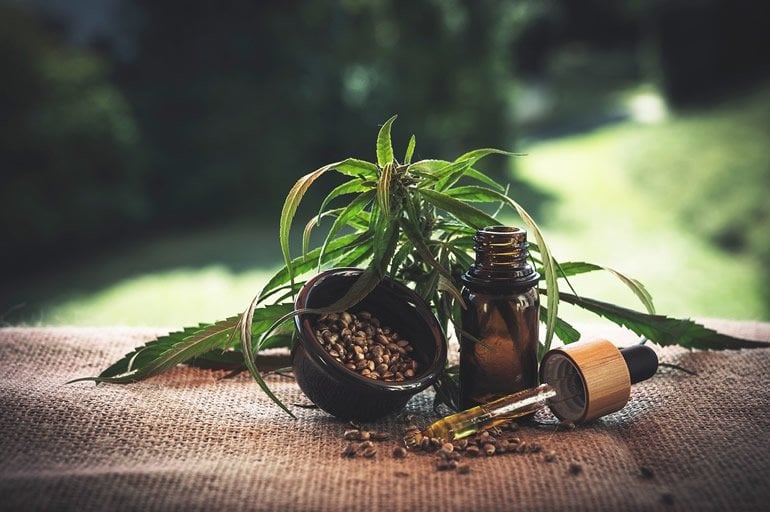Abstract: Staphylococcal enterotoxin, a bacterial toxin implicated in some ARDS instances, will also be averted by means of remedy with the hashish compound THC. Findings additionally recommend a possible function for the use of cannabinoids to regard ARDS led to by means of COVID-19.
Supply: College of South Carolina
Acute Respiration Misery Syndrome (ARDS), when led to by means of a bacterial toxin referred to as Staphylococcal enterotoxin, will also be utterly averted by means of remedy with Δ9-tetrahydrocannabinol (THC), a cannabinoid discovered within the hashish plant. This thrilling discovering, not too long ago revealed within the extremely cited British Magazine of Pharmacology, additionally suggests a conceivable remedy for ARDS led to by means of COVID-19.
This new paper is according to analysis research from the laboratories of Dr. Mitzi Nagarkatti and Dr. Prakash Nagarkatti on the College of South Carolina (UofSC) Faculty of Medication, Division of Pathology, Microbiology and Immunology. The Nagarkattis revealed “Protecting Results of Δ9-Tetrahydrocannabinol In opposition to Enterotoxin-induced Acute Respiration Misery Syndrome is Mediated by means of Modulation of Microbiota,” with co-authors Amira Mohammed, Hasan Alghetaa and Juhua Zhou, who additionally paintings of their UofSC Faculty of Medication laboratories, and Saurabh Chatterjee from the UofSC Arnold Faculty of Public Well being. Drs. Mitzi and Prakash Nagarkatti have for years studied how plant-derived compounds can be utilized to forestall and scale back irritation all through the frame.
The prevalence of ARDS in the USA is 78.9 consistent with 100,000 individuals/12 months and the mortality fee is 38.5 %. When inhaled, Staphylococcal enterotoxin could cause ARDS by means of activating immune cells to provide large quantities of cytokines resulting in “cytokine typhoon,” which is able to motive the lungs and different organs to fail, steadily leading to demise. This immune procedure is very similar to that observed in sufferers with critical COVID-19 who’re admitted to the clinic and increase ARDS accompanied by means of cytokine typhoon, which results in respiration and multi-organ failure. Those research due to this fact carry the thrilling risk of the use of cannabinoids to regard ARDS observed in COVID-19 sufferers.
Those research additionally confirmed that Staphylococcal enterotoxin alters the microbiome within the lungs resulting in the emergence of pathogenic microbiota. However THC is helping this symptom too, by means of selling really helpful micro organism that suppress irritation thereby combating the wear and tear to the lungs.
“Acute respiration misery syndrome is precipitated by means of a number of etiologic brokers. Recently, there are not any FDA-approved medication to regard ARDS as a result of which the mortality fee is with reference to 40 %. Our research recommend that THC is extremely efficient to regard ARDS and thus, medical trials are vital to analyze if this works,” stated Mitzi Nagarkatti.

“Cytokine typhoon is a large medical factor which results in multiorgan failure and steadily demise. It is usually observed in COVID-19 sufferers, and there are not any efficient remedy modalities by contrast syndrome. Now we have been running on cannabinoids for over twenty years and located that cannabinoids reminiscent of THC are extremely anti inflammatory. Thus, our research carry the thrilling recommendation to check THC towards ARDS observed in COVID-19 sufferers,” stated Prakash Nagarkatti.
The Nagarkatti laboratory has carried out many years of pioneering research on cannabinoids. Actually, their research on using some other cannabinoid derived from the hashish plant, cannabidiol (CBD), to regard autoimmune hepatitis were well-recognized within the box and feature resulted in FDA approval of CBD as an orphan drug to regard this dysfunction.
The Nagarkatti Laboratory has revealed broadly to exhibit that cannabinoids are potent anti inflammatory brokers that can be utilized safely to regard a number of inflammatory and autoimmune illnesses reminiscent of a couple of sclerosis, colitis, hepatitis and the like.
About this THC analysis article
Supply:
College of South Carolina
Contacts:
Press Workplace – College of South Carolina
Symbol Supply:
The picture is within the public area.
Authentic Analysis: Closed get right of entry to
“Protecting Results of Δ9‐Tetrahydrocannabinol In opposition to Enterotoxin‐prompted Acute Respiration Misery Syndrome is Mediated by means of Modulation of Microbiota” by means of Amira Mohammed et al. British Magazine of Pharmacology.
See additionally

Summary
Protecting Results of Δ9‐Tetrahydrocannabinol In opposition to Enterotoxin‐prompted Acute Respiration Misery Syndrome is Mediated by means of Modulation of Microbiota
Background
Staphylococcal enterotoxin‐B (SEB) is likely one of the maximum potent bacterial superantigens that exerts profound poisonous results by means of inducing cytokine typhoon. When SEB is inhaled, it may motive Acute Respiration Misery Syndrome (ARDS), which is steadily deadly and these days there are not any efficient remedy modalities.
Experimental Method
We used mouse type of SEB‐mediated ARDS to check the efficacy of Δ9‐tetrahydrocannabinol (THC). Those mice had been monitored for lung irritation, alterations in intestine and lung microbiota and manufacturing of brief‐chain fatty acids (SCFA). Gene dysregulation of lung epithelial cells used to be studied by means of transcriptome arrays. Fecal microbiota transplantation (FMT) used to be carried out to verify the function of microbiota in suppressing ARDS.
Key effects
Whilst SEB precipitated ARDS and 100% mortality in mice, THC safe the mice from fatality results. Pyrosequencing research published that THC led to vital and an identical alterations in microbiota within the lungs and intestine of mice uncovered to SEB. THC considerably larger the abundance of really helpful bacterial species, Ruminococcus gnavus, however lowered pathogenic microbiota, Akkermansia muciniphila. FMT showed that THC‐mediated reversal of microbial dysbiosis performed an important function in attenuation of SEB‐mediated ARDS. THC remedy additionally led to extend in SCFA, of which propionic acid used to be discovered to inhibit the inflammatory reaction. Transcriptome array confirmed that THC up‐regulated a number of genes like lysozyme‐1&2, β‐defensin‐2, claudin, zonula‐1, occludin‐1, Mucin2 and Muc5b whilst downregulating β‐defensin‐1.
Conclusions
Present find out about demonstrates for the primary time that THC attenuates SEB‐mediated ARDS and toxicity by means of changing the microbiota within the lungs and the intestine in addition to selling anti‐microbial and anti‐inflammatory pathways.
Supply By means of https://neurosciencenews.com/thc-ards-16912/



